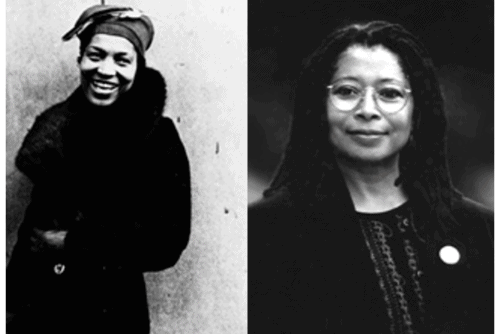As for the misconception that women only use intimacy or that they are more successful when using intimacy to promote social change, I direct the reader to the vast body of overt political work contained in these and other women’s video blogs. These blogs contain an overwhelming number of videos, links, and information intended to raise awareness and provide concrete action plans to address a variety of social causes, including poverty, human rights, AIDS, Net neutrality, copyright issues, sustainability, global Internet access, and a host of other public activist projects, both online and off. Roxanne Darling of Beach Walks with Rox, for instance, posted a video in which she joins other protestors to go to Senator Daniel Inouye’s office in Hawaii to present him with a petition supporting Net neutrality, a movement concerned with ensuring that certain corporations do not obtain preferential rights to access the Internet in ways that degrade or compromise others’ access. 1 The video is an excellent example of overt political action in which a woman publicly takes a stance both within her community and over the Internet on a crucial political issue.
Zadi Diaz, another high-profile pioneer in the video blogging community, promotes numerous causes on the many different video blogs she maintains. For example, in her blog karmagrrrl, she provides links to video bloggers around the world and promotes the work of people in underrepresented countries. 2 She provides links to such organizations as Amnesty International, Greenpeace, Human Rights Watch, One World, and Tolerance. Zadi is publicly involved in debates about new media, copyright issues, and the globalization of information technology. Through the JETSET video blog show that she produces with her husband, Steve Woolf, she connects with teens and kids, promotes their work, and talks about issues important to them. 3 Micki Krimmel of Mickipedia works for Revver, a video sharing site that, in contrast to similar sites, is dedicated to sharing revenues with video makers. Micki has led efforts to build online activist communities and has made a cameo appearance in Al Gore’s film An Inconvenient Truth. She is a regular contributor to a site called Worldchanging.com, where she writes about the democratization of media making. 4
I admire these and other women video bloggers’ efforts to raise awareness and promote social change in overt ways on the Internet. An entire book could easily be written analyzing the different ways women video bloggers are contributing to social change. In this paper, however, I would like to talk about specific videos and choices that promote social change in a different way. For me, the material I discuss below prompts a reconsideration of certain beliefs in a way that, for some reason, seeing a banner across someone’s blog saying “Make Poverty History.org” does not. I’d like to explore how these video bloggers create social change through more personal and vulnerable types of engagements with unknown members of one’s audience.
“Go deeper to see clearly”
In Beach Walk #211, “Go deeper to see clearly,” which was first posted on September 21, 2006, Roxanne Darling takes on the issue of blonds, bimbos, and bikinis and challenges her viewers to rewrite the semiotics of what an intelligent, technologically sophisticated woman should be allowed to look like. 5 Using a pre-recorded voice message from a viewer, Rox enacts taking a “caller” on her show and responding to his concerns. After expressing his admiration for her show and her perspective, “Philip from L.A.” says, “I wanted to ask that you [probably] do a show or segment on balancing your credibility. I was giving my son the talk the other day and I mentioned that you walk around in a bathing suit on TV, on the Internet, and yet your perspective and your insight shine through and you’re not perceived as a bimbo or something else. There [are] so many others that can’t be seen through with their exterior appearance.”
Although we cannot know what Philip means by giving his son “the talk,” one common interpretation is that he is indoctrinating his son about how to interact with women. He uses Rox’s show as an example of how a woman can wear certain clothes (such as a bathing suit) and also have important ideas and insights to share. Rox’s intimate moment of walking on the beach becomes a talking point for a man to introduce his son to certain healthy attitudes about respecting women. As Rox explains in this video, wearing a bathing suit is part of this particular intimate moment in her life. The whole idea behind Beach Walks is that, given her busy schedule running a Web design business with her partner, the only time to do her video blog is on her way to her morning swim. Normally, she wears a bikini for her swim. She juxtaposes what some people perceive as a sexualized stereotype, a blond woman in a bikini, with sharing her insights about self-improvement and solving problems. It is this juxtaposition that provides resources for changing attitudes about women to other people, including younger generations of men.
Despite the prediction that the importance of place would be greatly minimized on the Internet, Rox’s experiences demonstrate that place still matters quite a bit in terms of cultural expectations and behavior. During our interview, Rox mentioned that in Hawaii it is quite normal for people to walk around in beachwear, and at one time or another you will see “pretty much everyone you know,” including your banker and the people you go to church with, in their bathing suits. In the video she notes that this practice removes the sexual “charge” of seeing her in her bathing suit. She deliberately wanted to challenge people’s prejudices and assumptions about how someone’s looks correlate with their intelligence. Some feminists may be concerned to see Rox wearing a bathing suit and discussing serious issues. I share those concerns in some ways. However, people who would dismiss Rox’s decision to wear a bikini on her video blog risk hard-coding a semiotic association in which a woman in a bikini must inevitably be dismissed, sexualized, and judged by her exterior. Butler makes a similar argument with regard to hate speech. Formalizing a rejection of certain forms of speech, she maintains, would prevent words and symbols with unfortunate meanings and connotations to be re-used or repositioned in ways that could diminish or negate their hurtful impact. 6 Similarly, wearing a bathing suit while rewriting the semiotic stereotype of what a woman in a bathing suit should be like invites viewers to rethink their prejudices.
It is deeply disappointing to me that our society is still grappling with these prejudices. I am thus grateful for the way Rox’s video visually disrupts unfortunate assumptions about women. As a result of her video, she has received an outpouring of emails from women who are happy that she appears in a bikini being “normal” rather than striking up “tart poses” that call up a very different “energy.” According to Rox, many of her female viewers thanked her for “wearing a bikini and not being all cutesy and giggly and . . . allowing it to be just a normal part of life.”
Rox: So, in my world, you know, I like wearing a bikini. I’m going to be a hundred years old and I’m going to be wearing a bikini. You’re not gonna get me out of it, I don’t think, you know, because swimming in the ocean, I like to be wearing as little as possible. It’s just a more sensuous, comfortable experience and you see that all the time here, you know, people of every age wearing a bikini, people of every body type wearing a bikini . . .
. . . It’s basically about reclaiming the bikini from the stereotypical. . . all those men’s jokes about women and their bodies that, you know, you shouldn’t be allowed on the beach with that kind of a body and I’m, you know, “No, you have no right to say that. I have as much right to be here as anyone, you know, regardless of what I look like.” So, you know, there’s definitely some of that stuff that I’m trying to take on.
It is precisely through Rox’s sharing an intimate moment in her life—a walk on her way to a routine, morning swim—that she is able to challenge viewers’ prejudices about women who appear publicly in beach wear. Rox has received incredible feedback from her viewers who do not read her show in a sexualized way. She receives emails from people who are ill with serious diseases and other problems and find comfort in her inspirations. With a background in conflict resolution and in helping others deal with problems such as alcohol abuse, Rox makes herself available through private exchanges to connect with other people.
In some ways, Rox’s show is not without risk. She knows that her clients watch her show. She considers how they might perceive her and how that might affect her business. In one case, a client watched one of her shows in which she discussed a problem at work. As a result, Rox and her client ended up resolving the problem they had had. Rox’s experiences and her decision to be vulnerable to her audience have brought tremendous benefits to her life and those of her viewers.
- R. Darling, “Beach Walk #190 – Net Neutrality Hawaii Style,” http://www.beachwalks.tv/2006/08/31/beach-walk-190-net-neutrality-hawaii-style/. [↑]
- http://karmagrrrl.org/.[↑]
- http://jetsetshow.com/.[↑]
- Throughout the paper, I use first names to refer to the video bloggers and last names to refer to academic work. I cannot account for why this is so. I tried changing the video bloggers names to their last names when referring to them, but frankly this sounded artificial and looked odd on the page, especially when the comments on their blogs from viewers refer to them by first name. I also tried referring to the academics by their first names, but this too went against the grain of my training as an academic referring to other academics. This asymmetrical use of naming implies no judgment about the seriousness of the video bloggers’ work.[↑]
- R. Darling, “Beach Walk #211 – Go deeper to see clearly,” http://www.beachwalks.tv/2006/09/21/beach-walk-211-go-deeper-to-see-clearly/.[↑]
- J. Butler, Excitable Speech: A Politics of the Performative, (New York and London: Routledge, 1997).[↑]



